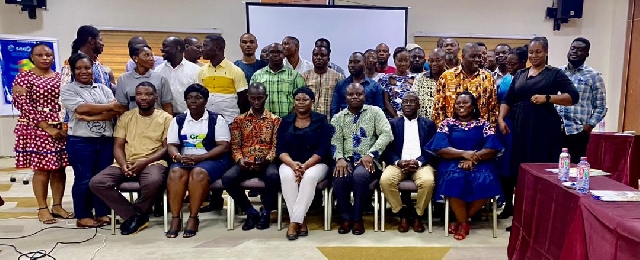Consider green businesses for socio-economic development – Employment Ministry tells youth
 The event, attended by development planners, district assembly staff, and other stakeholders, served as a platform to raise awareness about the benefits and opportunities within the green job sector
The event, attended by development planners, district assembly staff, and other stakeholders, served as a platform to raise awareness about the benefits and opportunities within the green job sector
The Ministry of Employment and Labour Relations (MELR) is calling on Ghanaians to seize opportunities presented by the National Green Jobs Strategy (2021-2025) for creating green jobs, emphasising its potential for socio-economic development.
The government's commitment to the Paris Agreement on Climate Change and the implementation of National Determined Contributions (NDCs) underscores the importance of green initiatives in the country.
The green economy is seen as a significant avenue for job creation and livelihood empowerment, given the right mix of economic and labour policies.
The National Green Jobs Strategy aims to coordinate and harmonise existing green interventions across various economic sectors.
The multi-sectorial approach involves enhancing institutional capacities, developing green skills and occupations, promoting green enterprises, and mobilising funds to support economic activities in green sectors.
Speaking at a sensitisation and awareness event on the National Green Jobs Strategy in Ho, the Head of Public Affairs at the Ministry of Employment and Labour Relations, Rev. Charllotte Hanson, urged Ghanaians to explore green job opportunities.
“While seeking white-collar jobs is not wrong, the National Green Jobs Strategy also supports green enterprises for decent job creation. Many successful entrepreneurs have ventured into their own businesses, which fall under the green category. We encourage the youth to consider green businesses for socio-economic development,” Rev. Hanson stated.
She highlighted examples such as fish-farming, bead-making, liquid soap manufacturing, bag and clothing production, emphasising that these are green areas where the youth can skill up for economic development.
A Senior Development Planning Officer at the Ministry of Employment and Labour Relations, Mr. Emmanuel Kwesi Adjei, noted that the initiative aims for a socially inclusive transition from the current brown economy to a green or circular economy.
The initiative ensures that the transition does not negatively impact workers’ livelihoods and that the labour force is prepared for the potential decent job creation in the green economy.
The Paris Agreement’s obligations to reduce emissions align with the green jobs initiative, contributing to a sustainable and environmentally friendly economy.
The event, attended by development planners, district assembly staff, and other stakeholders, served as a platform to raise awareness about the benefits and opportunities within the green job sector.
Trending News

Health Minister swears in new boards to drive key reforms in health sector
09:55
From herding cattle to Yale: Frederick Adongo's inspiring journey backed by Alhaji Agongo's philanthropy
07:56
Apple iPhone designer Jony Ive joins OpenAI in $6.5bn deal
13:48
Wontumi granted EOCO bail, but unable to meet bail conditions-Lawyer
08:11
Ngleshie-Laafa-Barima Chief challenges Nungua Mantse over statement on enstoolment authority
05:47
Perpetual Ekua Lomokie aims to be youngest to hold the position of NPP Women Organiser
11:10
Full operations resume at Ghana embassy in Washington DC Thurs. May 29, Foreign Affairs Ministry says
20:26
Margins ID Group CEO to highlight innovation in identity systems at 9th CEO Summit
04:10
Cedi appreciation attributed to deliberate policy measures by Mahama's administration – Sammy Gyamfi
10:59
TEAP calls for revocation of Godwin Armah's mining licence over alleged environmental degradation
20:09



